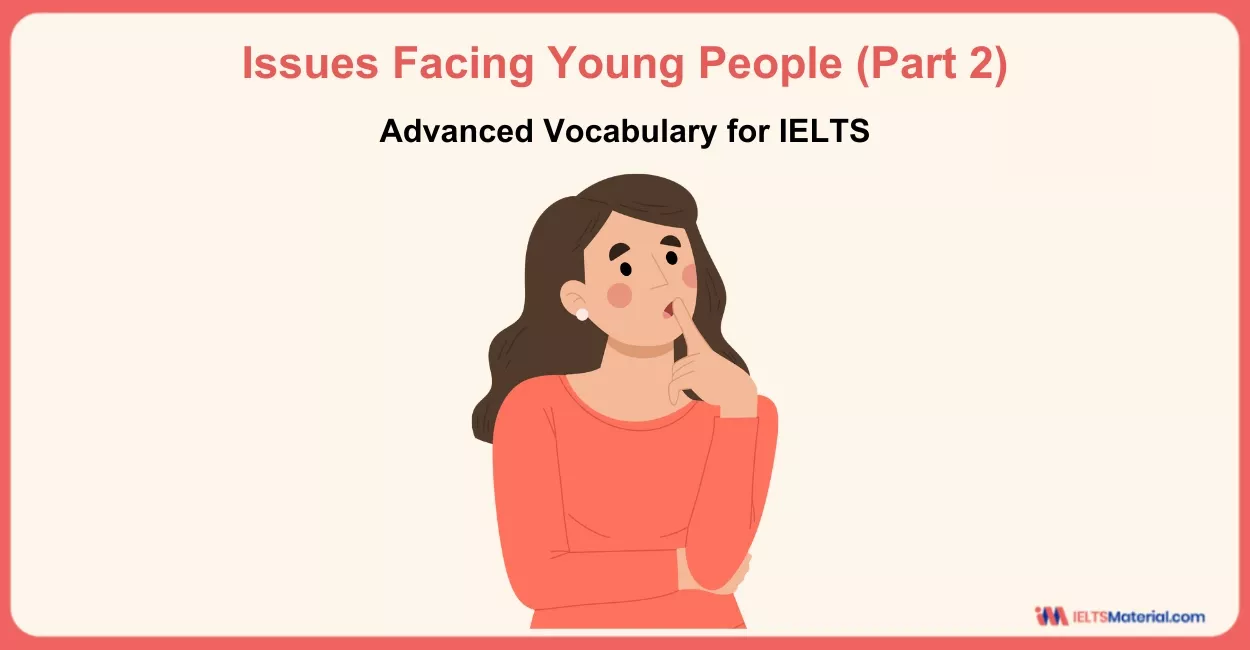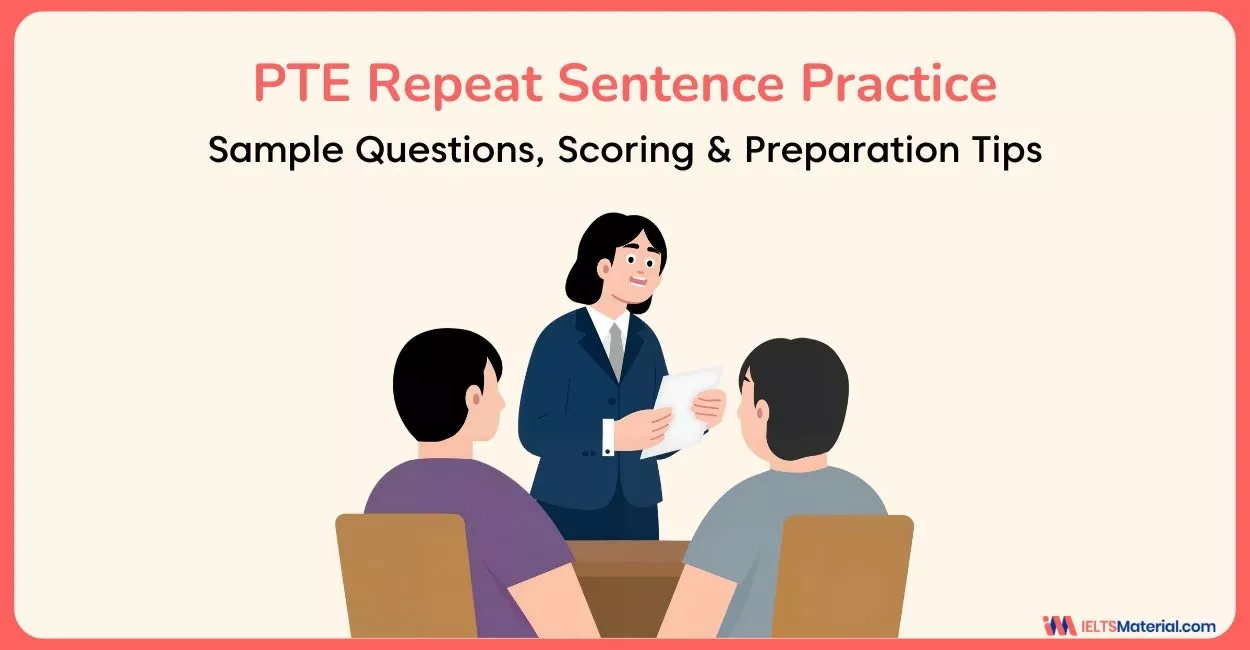Issues Facing Young People (Part 2) - Advanced Vocabulary for IELTS
5 min read
Updated On
-
Copy link
Want to express the challenges young people encounter? Learn the advanced vocabulary for the topic ‘Issues Facing Young People (Part 2)’ and understand how to use them to your advantage in the IELTS exam to show lexical flexibility in your answers.
Table of Contents

Limited-Time Offer : Access a FREE 10-Day IELTS Study Plan!
Issues Facing Young People (Part 2) provides you with an opportunity to expand your vocabulary knowledge. From rising unemployment and educational pressures to mental health concerns and the influence of digital media, these issues should be attended to with utmost care and respect. Therefore, being able to talk about such issues with an exact right set of vocabulary is an important aspect which you should put into consideration to achieve a higher band score in the IELTS Speaking and Writing sections.
Connect with our IELTS Trainers to crack your IELTS exam in no time! FREE Demo.
How to use Advanced Vocabulary on Issues Facing Young People (Part 2) in IELTS?
In the IELTS exam, where young people are mostly the focus of an issue in the IELTS Speaking and Writing Tasks, the use of advanced vocabulary would allow you with the precise articulation of ideas. This would make the presentation of argued ideas with more nuance and score a higher band score in lexical resources. Below are some of the tips which you can incorporate while learning how to use such advanced vocabulary on Issues Facing Young People (Part 2) into your answers.
- Create topic-specific vocabulary lists with themes like education, jobs, mental health, social media, peer pressure, and lifestyle. Remember to include nouns, verbs, adjectives, and adverbs with collocations.
- Make sentences with vocabulary on a regular basis instead of memorizing the definitions. Try to write five to ten sentences every day on youth issues so that such terms come naturally to you while you frame your answers.
- Practice using words in IELTS questions and try to provide advanced answers by speaking aloud. Record yourself to notice the natural usage, correct pronunciation, and fluency. For IELTS Writing, use the new words in topic sentences, supporting details, and conclusions.
- Apply spaced repetition to help retention. It is necessary that words should be reviewed after 1 day, 3 days, 1 week, and 1 month so that you make that a part of your conversation. Try to use them actively in writing and speaking so your usage will become automatic.
- Combine multiple words in your answers. Challenge yourself to fit 3–5 advanced-level words or collocations into one sentence or paragraph without it sounding awkward. This will also help become better at IELTS Grammar.
Prepare yourself with An Exclusive Grammar Workbook: Guide to All Grammatical Woes!
Exercises to Learn Advanced Vocabulary for Issues Facing Young People (Part 2)
As you begin learning new IELTS Vocabulary, it is crucial that you grasp the context in which such words can be used. This would help you get familiar with such words, making your answers stand out. Let's get started with the exercises below and level up your knowledge of using various vocabulary words for the topic, 'Issues Facing Young People (Part 2).'
-
Teen Mischief-making
EXERCISE 1. Match the verbs in Column A with the phrases in Column B.
|
Column A |
Answer |
Column B |
|
(a) falling (b) playing (c) dabbling (d) rebelling (e) getting (f) getting (g) getting/having (h) ganging (i) spreading (j) puling (k) making (1) acting (m) sparing (n) flunking (o) vying (p) flouting (q) having (r) sleeping |
|
(i) around (ii) with drugs (iii) up to no good (iv) against authority (v) a run in with the law (vi) the class (vii) a criminal record (viii) one over on your peers (ix) rash decisions (x) for attention (xi) no thought for anyone (xii) on the spur of the moment (xiii) a strop (xiv) up on one another (xv) malicious rumours (xvi) the rules (xvii) truant (xviii) in with the wrong crowd |
EXERCISE 2. Now use a number of the phrases above to fill in the gaps. You will not need to use all of them, and nor will you have to change the verb form or tense for the correct answers.
1 I am____________ and it’s looking very likely that I’ll have to repeat.
2 No doubt that ‘angel’ of ours is____________ again with those mischievous friends of his.
3 Why must you persist in____________ ? One of these days you will get caught and wind up in serious trouble.
4 If I catch your son____________ again, Mrs White, he will automatically be expelled; his attendance record is already appalling.
5 Alex and Paula are always____________ ; I have to be very careful to devote equal time to them both so as not to be accused of favouritism.
-
Teen Relationships and Relationship Issues
EXERCISE 3. Select a verb from the box which fits in each gap and change the form or tense as appropriate. Some verbs are used more than once.
| fall | call | do | go | stand |
| break | chat | brush | ask | fall |
1 We’d been __________ steady for about six months before he __________ it off.
2 They__________ off the engagement just before Christmas and__________ up.
3 I spent the whole night__________ her up and eventually plucked up the courage to__________ her out.
4 She __________ me off and said she wasn’t interested.
5 When it was clear to us both that it wasn’t working, we __________ our separate ways for good.
6 He __________ the dirt on me with my best friend; I don’t think I can ever forgive either of them.
7 We’d arranged to meet outside Barney’s Cafe at 8 o’clock, but she __________ me up.
8 We’re __________ up and going to __________ it quits.
9 I __________ for her in a bad way and was besotted for the best part of two years.
10 We__________ head over heals in love probably the first time we ever met; it was sort of instant.
Answer Key for Exercises to Learn Advanced Vocabulary for Issues Facing Young People (Part 2)
Well done! Did you notice how many words appeared to be familiar? Now, it’s time to check the answers and compare them with yours. While doing so, you need to make sure that you note down reasons for the choices you made.
EXERCISE 1.
|
a. xviii |
b. xvii |
c. ii |
d. iv |
e. iii/viii |
f. iii/viii |
|
g. vii |
h. xiv |
i. xv |
j. xiii |
k. ix |
l. xii |
|
m. xi |
n. vi |
o. x |
p xvi |
q. v |
r. i |
EXERCISE 2.
- flunking the class
- getting up to no good
- flouting the rules
- playing truant
- vying for attention
EXERCISE 3.
|
1. going-broke/ called |
2. called/broke |
3. chatting/ask |
4. brushed |
5. went |
|
6. did |
7. stood |
8. breaking/call |
9. fell |
10. fell |
Enroll into our Free IELTS Webinar and learn more about techniques to improve your grammar for IELTS.
Discussing topics such as Issues Facing Young People (Part 2) effectively would require more than just learning common vocabulary. Rather, you need to look for exact, topic-specific, and advanced words and phrases for your IELTS Speaking and Writing answers. Through systematic strategies and regular practice sessions with these words, you can present subjective ideas, offer sharp examples, and create persuasive arguments in your responses.
Also Check:

Start Preparing for IELTS: Get Your 10-Day Study Plan Today!
Explore other IELTS Articles

Haniya Yashfeen

Kasturika Samanta
Recent Articles

Nitika Gupt

Nehasri Ravishenbagam

Nehasri Ravishenbagam







Post your Comments